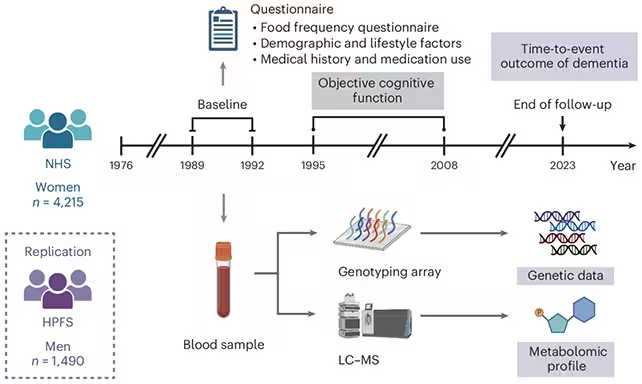5 Minutes
A large US study reports that adherence to a Mediterranean dietary pattern is associated with a lower risk of cognitive decline and Alzheimer’s disease, even among people who carry high‑risk APOE4 gene variants. Researchers from the Harvard T.H. Chan School of Public Health analyzed decades of diet, cognitive and genetic data and found that those who most closely followed the Mediterranean diet showed the smallest declines in cognition—particularly individuals with two copies of the APOE4 variant.
What is the Mediterranean diet and why it matters
Named for the traditional eating patterns of countries bordering the Mediterranean Sea, the Mediterranean diet emphasizes fruits, vegetables, whole grains, legumes, nuts, olive oil and fish while limiting red meat, processed foods and added sugars. This dietary pattern has been associated with cardiovascular and metabolic benefits and, in prior trials, linked causally to improvements in cognitive outcomes.
Epidemiologist Yuxi Liu, lead author of the new analysis, explains that one reason for focusing on this diet is that 'it is the only dietary pattern that has been causally linked to cognitive benefits in a randomized trial.' The current work extends those findings by examining whether the diet modifies genetic risk.
Data, methods and metabolic profiling
The research merged long-term dietary records, genetic testing and cognitive assessments from two large cohorts. Data included 4,215 women with records spanning 1989–2023 and 1,490 men with records from 1993–2023. Investigators cross-referenced dietary scores, dementia diagnoses and APOE genotype and also measured blood metabolites—small molecules that reflect how the body processes nutrients and maintains cellular metabolism.
The team compared cognitive trajectories across groups defined by diet quality and APOE status. Individuals with the highest Mediterranean diet adherence had the lowest incidence of dementia and the slowest rates of cognitive decline. The protective association was most pronounced among participants carrying two copies of APOE4, a genotype known to confer high risk for late‑onset Alzheimer’s disease.

Metabolites reveal potential mechanisms
Analysis of blood metabolite profiles showed that the Mediterranean diet was associated with shifts in metabolic pathways previously linked to neurodegeneration. These metabolite changes were stronger in participants with high genetic risk, suggesting that diet can broadly influence biochemical networks that relate to dementia vulnerability. However, metabolites were sampled only once, limiting insight into dynamic changes over time.
Implications, caveats and future directions
The findings support the idea that dietary strategies could reduce dementia risk for the general population and may be particularly important for people with high genetic susceptibility. The study suggests possible biological mechanisms by which diet affects dementia risk and raises the prospect of using metabolite markers to stratify risk or tailor interventions.
Limitations are important: the cohorts consisted largely of well‑educated individuals of European ancestry, and the study design is observational, so it cannot definitively prove cause and effect. Single time‑point metabolite measures and potential unmeasured confounders also constrain interpretation. The authors note the need for diverse cohorts, repeated metabolomic sampling and interventional studies that test whether targeted dietary changes alter metabolite profiles and dementia outcomes.
Expert Insight
Dr. Elena Marquez, Professor of Neurology and Nutritional Neuroscience, University of California, San Diego, comments: 'This study strengthens the evidence that lifestyle choices can modify biological risk for Alzheimer’s. While genetics set a baseline risk, metabolic pathways—many responsive to diet—appear to mediate part of that risk. Clinically, the Mediterranean diet is a low‑risk, high‑potential intervention that aligns with cardiovascular and metabolic health recommendations.'
Conclusion
The Harvard-led analysis adds weight to the growing consensus that dietary patterns influence long-term brain health. Adhering to a Mediterranean-style diet correlated with reduced cognitive decline and lower dementia incidence, with especially large relative benefits observed among people carrying two APOE4 alleles. While more diverse, prospective and interventional research is needed to establish causality and optimized strategies, the study reinforces diet as a practical lever in the prevention toolbox for Alzheimer’s disease.
Source: sciencealert


Leave a Comment